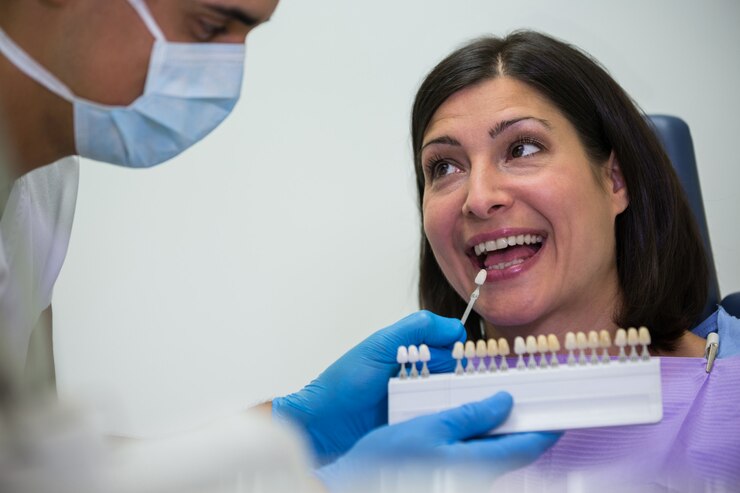At Carl F. Lipe’s premier dental services in Denver, Colorado. Our commitment to excellence extends to our expertly crafted dental bridges, designed to restore both the function and aesthetics of your smile with precision and care.
What are Dental Bridges?
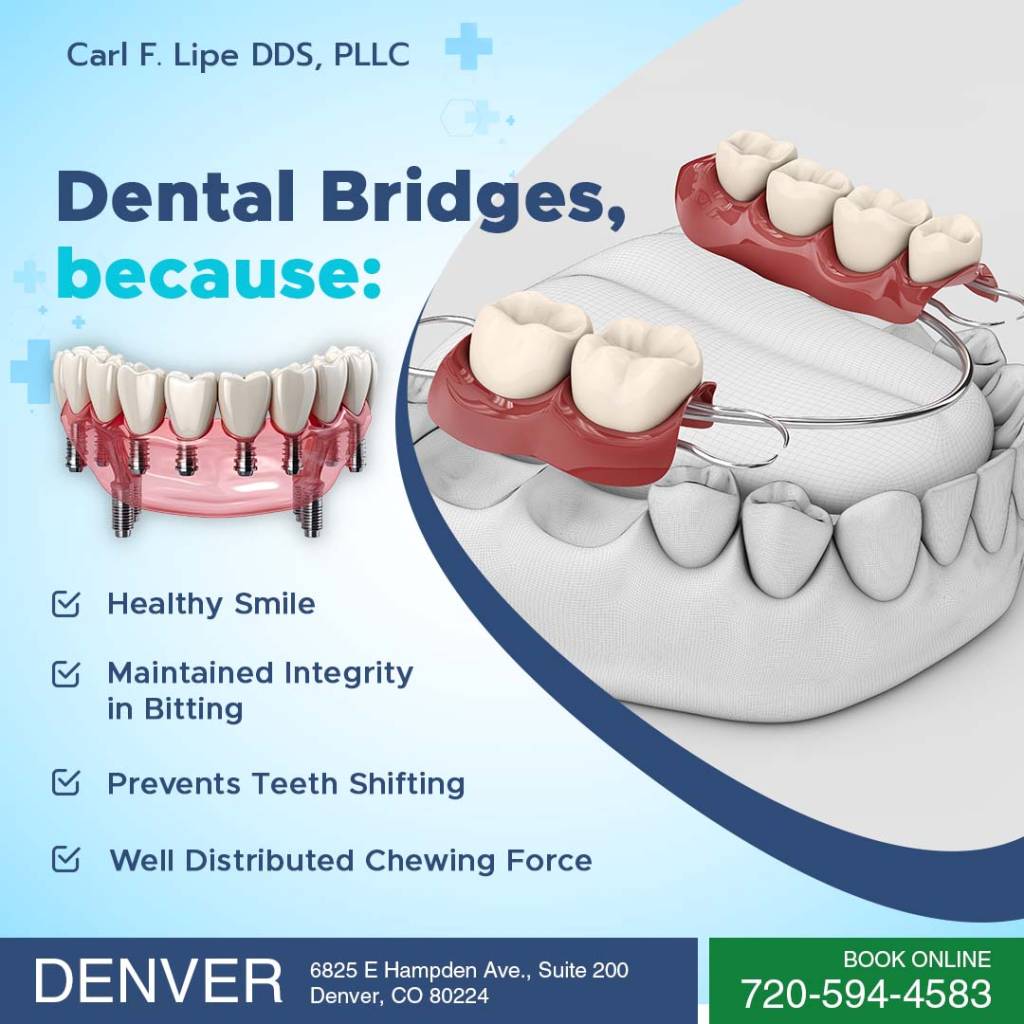
Dental bridges are the prosthetic devices that replace missing teeth. The term “bridge” indicates the gap created by a missing tooth. A dental bridge helps to restore the functionality and aesthetics of your smile. It is made up of one or several artificial teeth called pontics. It consists of crowns fixed over the natural teeth and artificial teeth that help bridge the gap.
These residues not only bridge the gap but also maintain your natural face shape, stop remaining teeth from moving out of place, and help ensure proper bite alignment. It can help prevent future dental problems such as chewing difficulties, difficulty in speaking and biting, and added stress on your remaining natural teeth.
Materials used for dental bridges are porcelain, ceramics, or metal alloys. Each is selected to match your natural tooth’s color, size, and shape. A dental bridge is usually made by preparing the teeth that will be the abutment, making impressions to ensure a perfect fit, and then placing and securing the bridge.
Overall, dental bridges are an excellent solution to tooth loss. They improve both your oral health and confidence.
Why Do You Need Dental Bridges?
Restore Function: Missing teeth can make chewing and speaking difficult. Dental bridges restore your ability to eat your favorite foods and speak clearly.
Maintain Facial Structure: When a tooth is lost, the surrounding teeth can shift, affecting the shape of your face. Bridges help preserve your facial structure.
Prevent Dental Issues: Gaps left by missing teeth can lead to problems such as gum disease and jaw joint disorders. Bridges prevent these issues by filling the space.
Enhance Confidence: A complete smile can significantly boost your self-esteem and confidence in social and professional settings.
Top 5 Benefits of Dental Bridges
- Improved Appearance: Dental bridges are designed to match the color, shape, and size of your natural teeth, seamlessly blending into your smile.
- Enhanced Function: Enjoy the ability to eat, speak, and smile confidently with restored dental function.
- Preserved Oral Health: By preventing adjacent teeth from shifting and reducing the risk of gum disease, bridges contribute to long-term oral health.
- Durability: With proper care and regular dental check-ups, dental bridges can last 10 years or more.
- Convenience: Unlike removable dentures, bridges are fixed in place, eliminating the need for daily removal and cleaning.
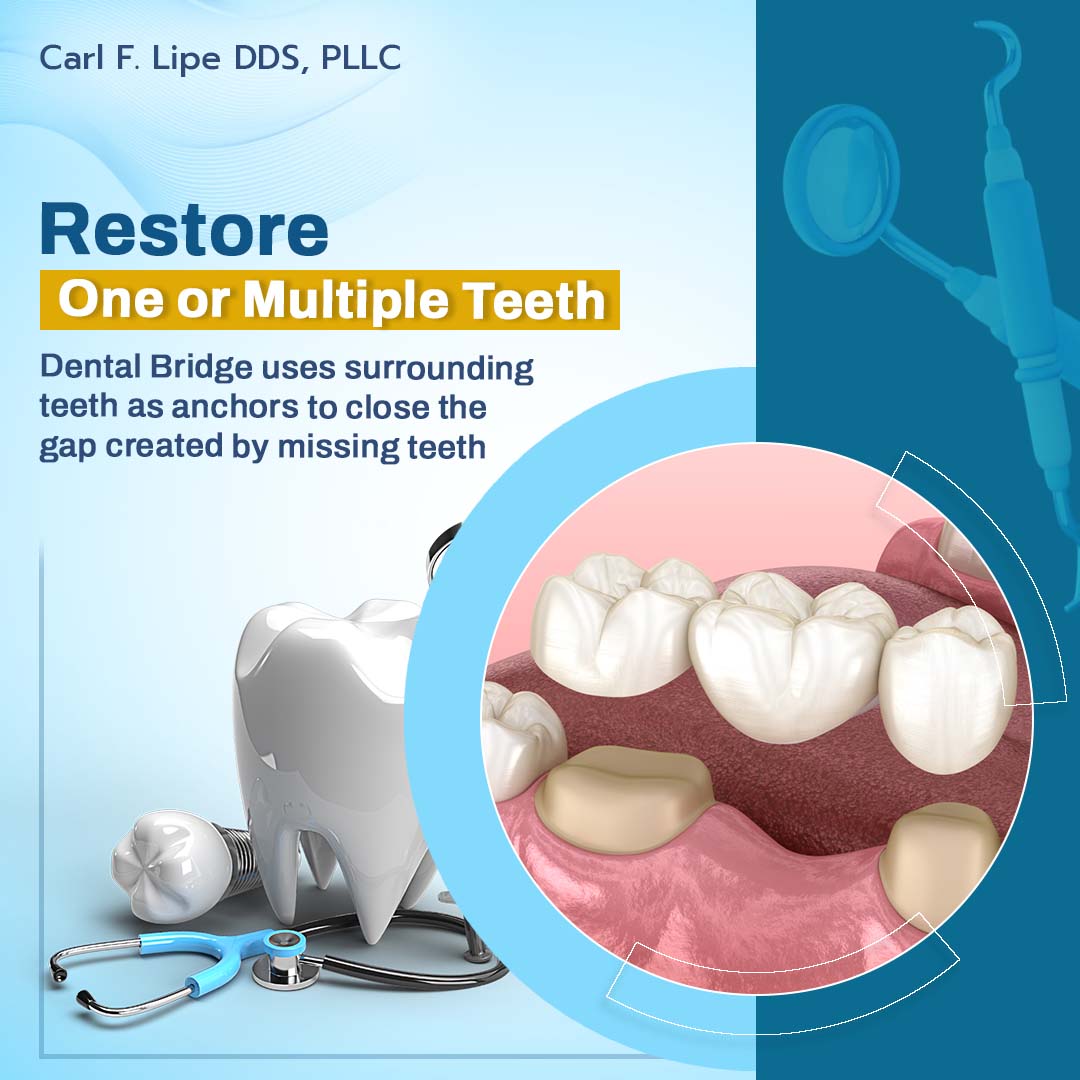
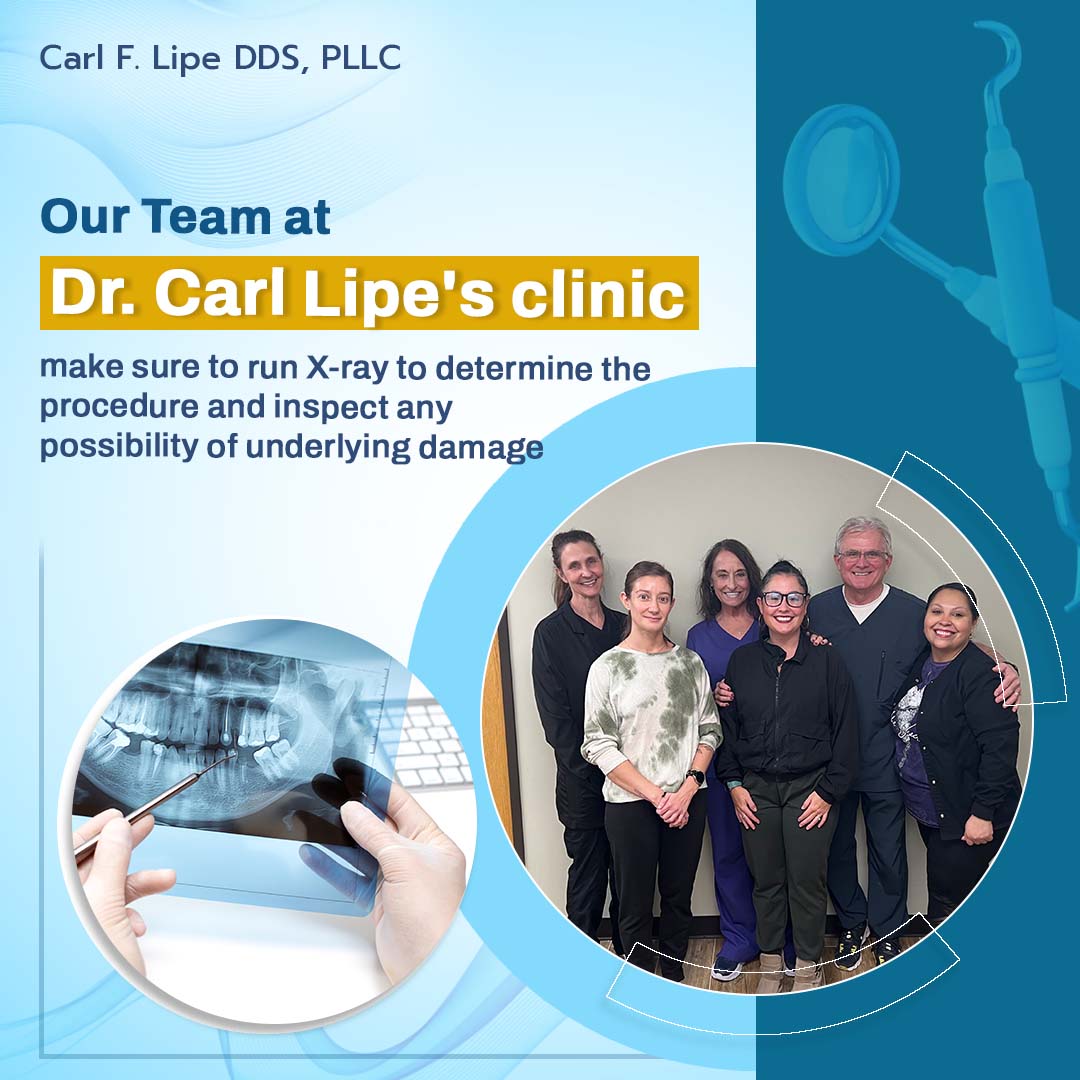
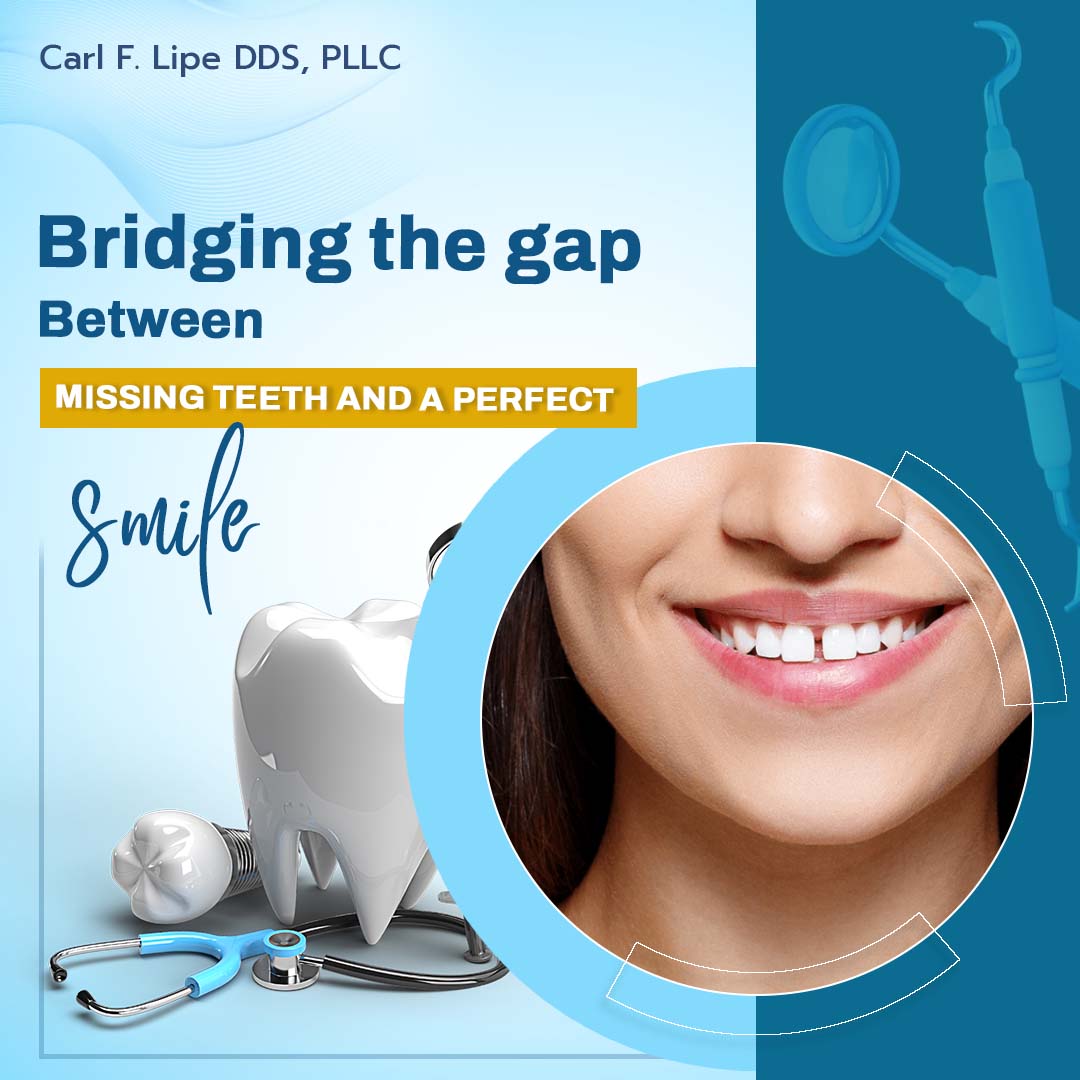
Ideal candidates for dental bridges are individuals who
- Have one or more missing teeth due to decay, injury, or extraction.
- Have healthy teeth adjacent to the gap, capable of supporting the bridge.
- Desire a fixed, permanent solution for tooth replacement.
Types of Dental Bridges
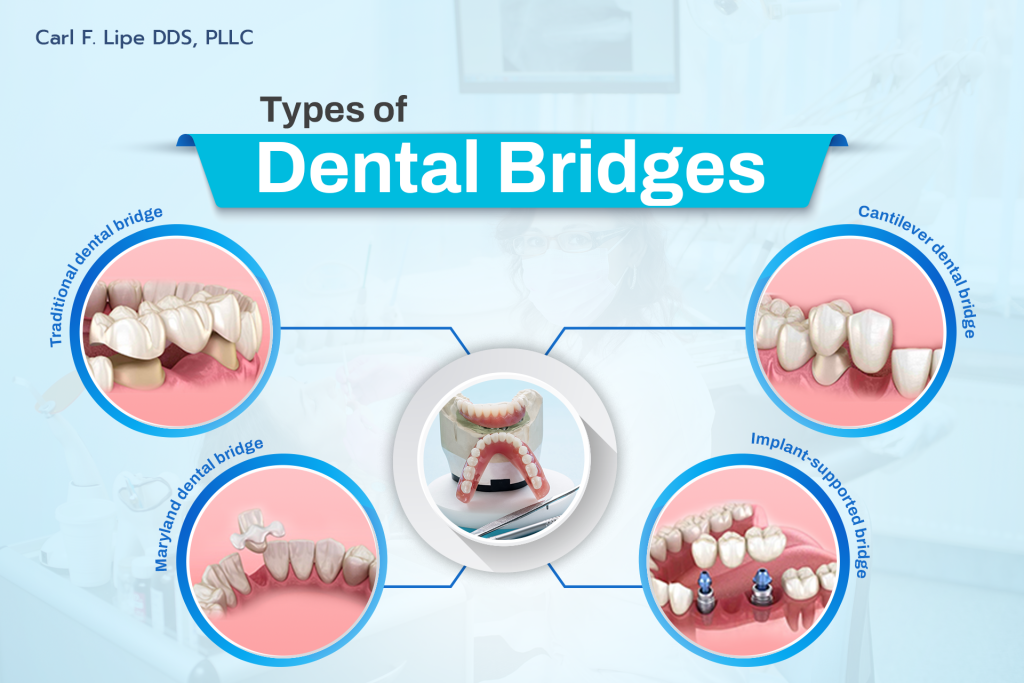
At Carl F. Lipe, we offer a range of dental bridges tailored to meet your specific needs:
- Traditional Bridges: This type of bridge consists of one or more pontics (artificial teeth) held in place by dental crowns on adjacent natural teeth.
- Cantilever Bridges: When there are adjacent teeth on only one side of the gap, a cantilever bridge may be used to fill the space.
- Maryland Bonded Bridges: Also known as resin-bonded bridges, these are made of porcelain or metal “wings” that are bonded to the backs of adjacent teeth.
- Temporary Dental Bridges: Used as a short-term solution to protect the gap until a permanent bridge is ready. Typically made from less durable materials like acrylic or composite resin. They offer temporary stability and function while waiting for the permanent bridge..
- Permanent Dental Bridges: Designed to provide a long-term solution for missing teeth. Made from strong materials like porcelain, ceramic, or metal alloys for durability and longevity. Securely bonded to adjacent teeth or implants, offering greater stability and comfort.
Temporary Dental Bridge vs Permanent Dental Bridge
| Feature | Temporary Dental Bridge | Permanent Dental Bridge |
|---|---|---|
| Purpose | Used as a short-term solution to protect the site until the permanent bridge is ready. | Provides a long-term solution for missing teeth, designed to last many years with proper care. |
| Material | Typically made from less durable materials such as acrylic or composite resin. | Made from stronger materials like porcelain, ceramic, or metal alloys for durability and longevity. |
| Stability | Less stable and may not fit as precisely, meant to be a temporary fix. | Securely bonded to adjacent teeth or implants, offering greater stability and comfort. |
| Comfort | May not be as comfortable or aesthetically pleasing as a permanent bridge. | Designed for optimal fit, comfort, and appearance, closely matching natural teeth. |
| Maintenance | Requires careful handling to avoid damage; may need to be adjusted or replaced if damaged. | Requires regular oral hygiene but is more resilient and easier to maintain over time. |
What To Expect During a Dental Bridge Procedure at Dr. Carl Lipe’s Clinic?
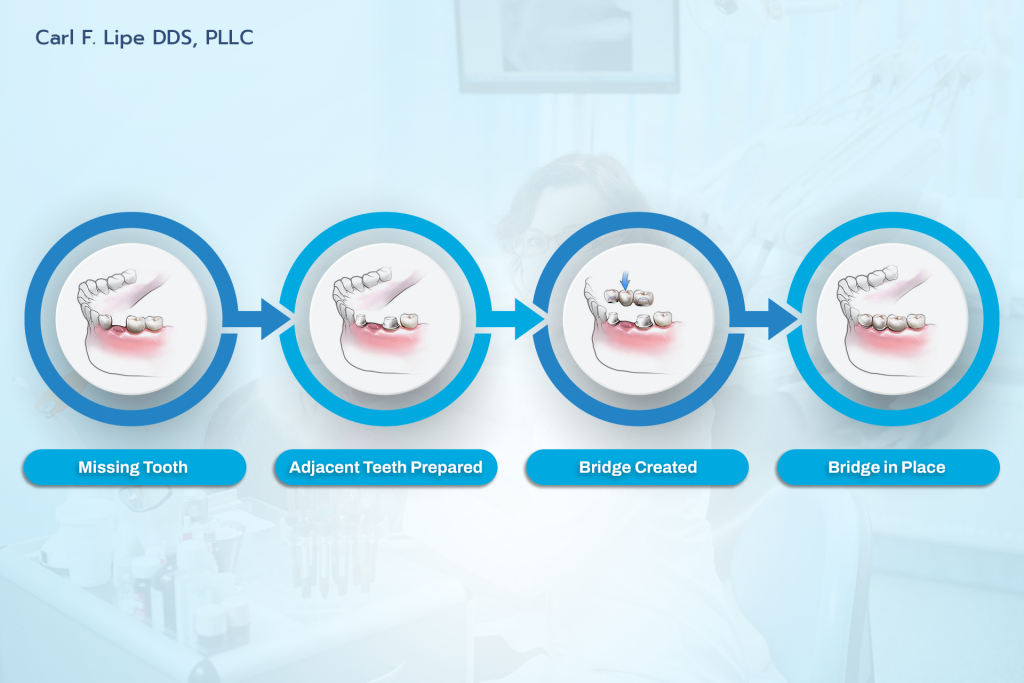
1. Initial Consultation and Examination
At Dr. Carl Lipe’s clinic, patients undergo a comprehensive examination of their teeth and gums to determine whether a dental bridge is an effective solution or not. This may involve taking X-rays and impressions to plan the procedure accurately.
2. Preparation of Abutment Teeth
The adjacent teeth are carefully prepared to provide support to the bridge. For this purpose, the teeth are reshaped by removing a portion of enamel. It will ensure enough room for the crowns to be placed over them.
3. Impressions and Temporary Bridge
When the abutment teeth are prepared, impressions of your teeth are taken. These impressions help to create the pontics, custom bridges, and crowns. While your permanent bridge is being crafted, we will place a temporary bridge to protect your teeth and gums.
4. Fitting the Permanent Bridge
At the point, when your specially designed super durable scaffold is prepared, we will eliminate the impermanent bridge and fit the new one. Dr. Lipe will carefully check and adjust the bridge to guarantee it fits impeccably and feels great.
5. Cementing the Bridge
After confirming the fit and bite, Dr. Lipe will securely cement the permanent bridge using high-quality dental cement. This step ensures that the bridge is effectively attached to the abutment teeth.
6. Final Adjustments and Instructions
Finally, Dr. Lipe will make sure that the bridges are appropriately aligned and that you can comfortably bite. We will provide you with care instructions for the new bridge and proper brushing and flossing techniques.
How to Care for a Dental Bridge ?
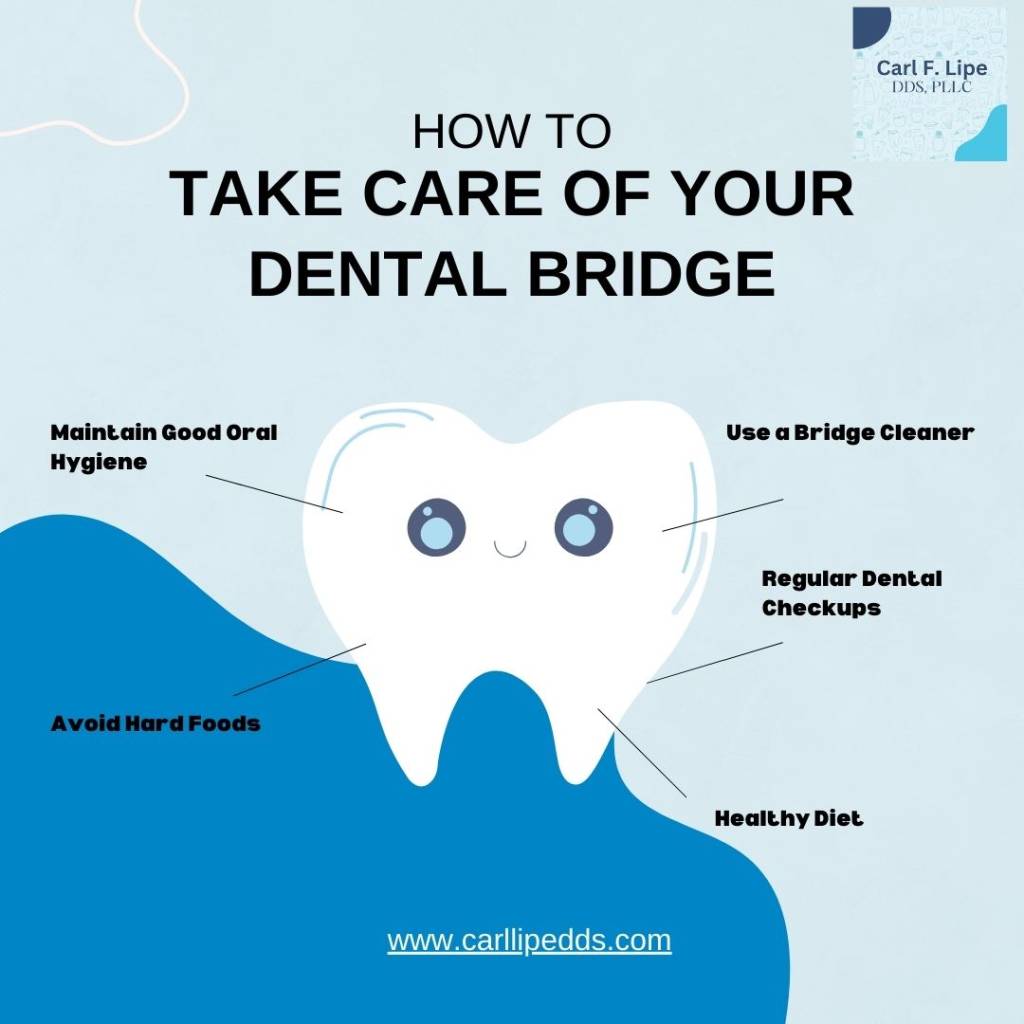
- Maintain Good Oral Hygiene: Brush your teeth at least twice a day and floss daily to remove plaque and food particles from around the bridge and surrounding teeth.
- Use a Bridge Cleaner: Consider using a special floss threader or an interdental brush to clean under the bridge where a regular toothbrush cannot reach.
- Regular Dental Checkups: Visit your dentist regularly for professional cleanings and checkups to ensure the bridge and surrounding teeth remain healthy.
- Avoid Hard Foods: Refrain from chewing on hard foods or objects that could damage or dislodge the bridge, such as ice, hard candy, or pens.
- Healthy Diet: Maintain a balanced diet rich in vitamins and minerals to support overall oral health and avoid sugary or acidic foods that can lead to decay and gum disease.
Dental Bridges vs Dentures
While both dental bridges and dentures are used to replace missing teeth, there are key differences:
| Feature | Dental Bridges | Dentures |
|---|---|---|
| Stability and Comfort | Fixed in place, bridges offer stability and comfort similar to natural teeth. | Removable prosthetics that may require adhesives for stability. |
| Cleaning | Do not require removal for cleaning; cleaned like natural teeth. | Need to be removed for cleaning. |
| Fit and Adjustments | Generally require fewer adjustments once placed. | May need adjustments over time to maintain fit and comfort. |
| Longevity | Typically last 10-15 years with proper care. | Longevity varies; may need to be replaced more frequently, depending on wear and care. |
| Impact on Surrounding Teeth | Anchored to adjacent teeth, which may require alteration. | No impact on surrounding teeth, as they are supported by gums and jawbone. |
Permanent Dental Bridge vs Implant
| Feature | Permanent Dental Bridge | Dental Implant |
|---|---|---|
| Procedure | Involves placing a bridge anchored to adjacent teeth, requiring the removal of some tooth enamel. | Involves surgically placing a titanium post into the jawbone, topped with a crown. |
| Durability | Typically lasts 10-15 years with proper care. | Can last a lifetime with proper care. |
| Aesthetics | Provides a natural look, but adjacent teeth might be affected. | Offers a more natural appearance, as it mimics the look and feel of natural teeth. |
| Bone Health | Does not prevent bone loss in the jaw where the tooth is missing. | Helps preserve jawbone health by stimulating bone growth through the implanted post. |
| Cost | Generally less expensive initially, but may require replacements over time. | Higher initial cost, but often considered more cost-effective in the long term due to its longevity. |
Why Choose Us for Dental Bridges in Denver?
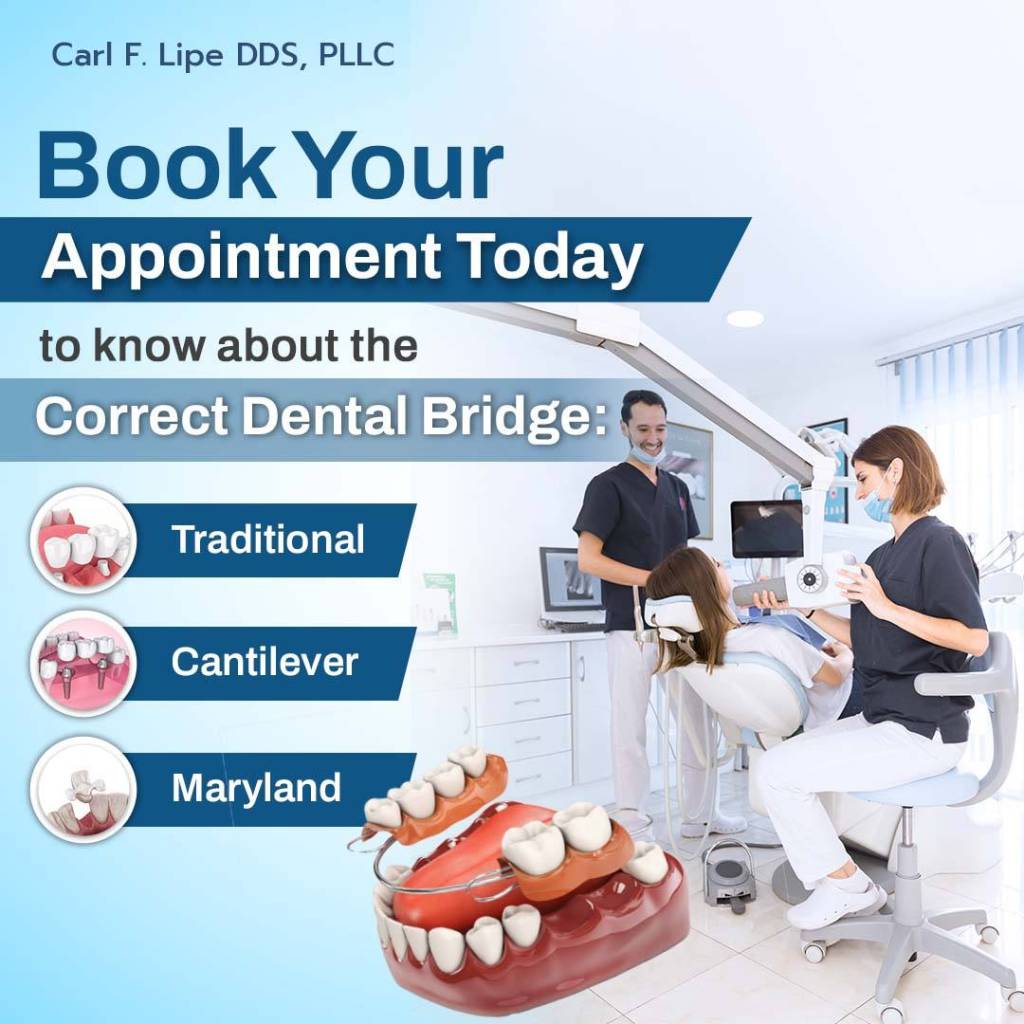
Choose Carl F. Lipe, DDS, PLLC for your dental bridges in denver because of our commitment to quality, state-of-the-art technology, and personalized dental care. Our team’s expertise ensures you receive the best possible treatment with results that speak for themselves.
We also offer Cosmetic Dentistry, Tooth Extraction , Denture Solution , Dental implants , Full Mouth Reconstruction , Dental Crown and more. Do follow us on facebook & instagram for dental tips & advice.
- Our dental bridges are meticulously crafted using the latest techniques and materials, ensuring a perfect fit and natural appearance.
- With decades of combined experience, our dental professionals have honed their skills to deliver outstanding results.
- We understand that every patient is unique. Our bridges are custom-made to match the shape, color, and size of your natural teeth.
- Your comfort and satisfaction are our top priorities. From the initial consultation to post-procedure care, we are here for you every step of the way.
Clinic Video
FAQ
What is a dental bridge?
A dental bridge is a fixed prosthetic device used to replace one or more missing teeth by anchoring artificial teeth to adjacent natural teeth or implants.
How much does a dental bridge cost?
The cost varies but typically ranges from $500 to $1,000 per tooth and for a 6-unit bridge it costs around $2500 to $5500. The cost varies on the types of materials used and the complexity of the placement.
How long does it last?
With proper care, the lifespan of a dental bridge varies between 5 to 15 years.
Is Dental Bridge permanent?
Dental bridges are designed as a long-term solution but may eventually need to be replaced or repaired.
What does a dental bridge look like?
A dental bridge looks like natural teeth and is custom-made to match the color, shape, and size of your existing teeth.
Can a dental bridge be removed and recemented?
Yes, in some cases, a dental bridge can be removed and recemented if it becomes loose or needs adjustment.
How to fix a loose dental bridge at home?
It is not recommended to fix a loose dental bridge at home. Consult your dentist for proper adjustment and recementing.
How long does it take for a dental bridge to settle?
It typically takes a few weeks to a couple of months for a dental bridge to settle fully and feel comfortable.
How to clean under a dental bridge?
Use a special floss threader, interdental brush, or water flosser to clean under the bridge and maintain oral hygiene.
Can a dental bridge be repaired?
Yes, depending on the extent of the damage, a dental bridge can be repaired by a dentist.
Can I have an MRI with a dental bridge?
Yes, most dental bridges do not interfere with MRI scans. Inform your radiologist about your dental bridge before the scan.
How long after dental bridge can I eat?
It is advised not to eat anything solid or semi-solid during the first 24 hours. You can typically eat a few hours after the placement of a dental bridge but stick to soft foods initially.
How much does a bridge cost with dental insurance?
Dental insurance may cover a portion of the cost, usually around 50%, depending on your plan and coverage details.
How much does Delta Dental cover for a bridge?
Coverage varies, but Delta Dental typically covers about 50% of the cost of a dental bridge. Check your specific plan for details.
How to clean a permanent dental bridge?
Brush and floss as you would with natural teeth, using special tools like a floss threader or water flosser for thorough cleaning.
How to fix a cracked dental bridge?
A cracked dental bridge should be repaired by a dentist. Do not attempt to fix it at home.
What are the disadvantages of a dental bridge?
Potential disadvantages include the need to alter adjacent teeth, the risk of decay under the bridge, and possible bridge failure over time.
What does a temporary dental bridge look like?
A temporary dental bridge is usually made of acrylic and designed to provide a temporary solution until a permanent bridge is ready.
Does a dental bridge feel natural?
A well-fitted dental bridge should feel natural and comfortable in your mouth.
Can a dental bridge be whitened?
No, dental bridges cannot be whitened. If whitening is needed, it should be performed before the bridge is placed.
Can a dental bridge cause bad breath?
If not properly cleaned, food particles and bacteria can accumulate, leading to bad breath. Maintain good oral hygiene to prevent this.
Can it cause headaches?
Poorly fitted bridges or issues with bite alignment can cause headaches. Consult your dentist if you experience discomfort.
Does Medicaid cover a dental bridge?
Yes, dental bridge services are covered under Medicaid but it varies by state and individual plan. Check with your local Medicaid office for specific coverage details.
